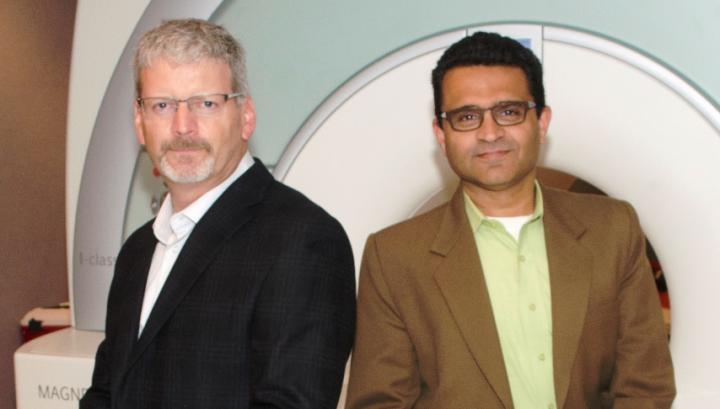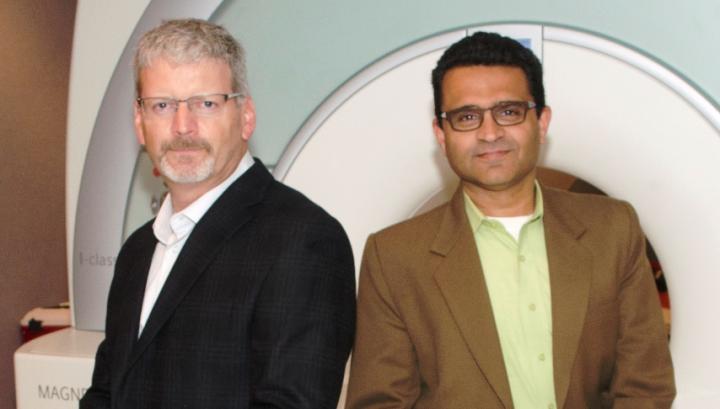
Credit: Wayne State University
DETROIT – Researchers in the Wayne State University School of Medicine's Department of Psychiatry and Behavioral Neurosciences will use a new five-year, $3.2 million grant from the National Institute of Mental Health to explore the underlying mechanisms of impaired learning and memory in schizophrenia from the perspective of brain plasticity, function and network dynamics.
The NIMH defines schizophrenia as a chronic and disabling mental disorder that affects how a person thinks, feels and behaves, including loss of reality due to hallucinations, delusions, unusual or dysfunctional ways of thinking, and agitated body movements. People with the condition also have difficulty beginning or sustaining activities, focusing or paying attention, or remembering information immediately after learning it. About 1 percent of the U.S. population — approximately 2.2 million people — have schizophrenia, but the neurobiology of the illness remains poorly understood.
Principal Investigator and Associate Professor Jeffrey Stanley, Ph.D., and Co-Principal Investigator and Professor Vaibhav Diwadkar, Ph.D., lead the study "Advancing innovative brain imaging to detect altered glutamate modulation and network dynamics in schizophrenia," which was funded on its first submission. The study is the first to combine functional MRI (fMRI) and complex analyses of brain imaging data with innovative measurement of the brain's functional neurochemistry using functional magnetic resonance spectroscopy (fMRS).
"While fMRI data are somewhat 'distant' from fundamental neurobiological processes because the signal relies on blood flow that is correlated with — but distinct from — neurophysiological and neuro-chemical events, in developing fMRS we are able to measure and quantify changes in hippocampal glutamate in the brain. We have an imaging technique that may provide more direct information about functional changes in the brain," Dr. Stanley said.
The combination of approaches will provide objective biological markers of this poorly understood illness. The team plans to explore interventions that may eventually normalize the abnormal markers. "This is a longer-term goal but is central to our collective aims," he added.
The duo co-directs the department's Brain Imaging Research Division, which encompasses about 40 staff and student trainees involved in multiple areas of research, including imaging studies into obsessive compulsive disorder, mood disorders, borderline personality disorder, ADHD and reading disabilities, and more. The division has published extensively in the areas of schizophrenia and psychosis in the last seven years, with research supported by the NIMH, the Brain and Behavior Research Foundation, and other private foundations.
"Because the pathophysiology of schizophrenia remains obscure, our efforts have been in the area of innovative image analyses and methods development. Schizophrenia is fundamentally a disorder that disrupts cognitive and memory processing, psychological processes that depend on normal communication between brain regions" Diwadkar said. "Therefore, using fMRI, we have primarily been interested in how brain regions fail to 'communicate' appropriately during basic processing. Several of these investigations have zeroed in on the dorsal prefrontal cortex, or dPFC, and the hippocampus, two brain regions that are particularly implicated in the illness. The dPFC has been particularly implicated with regard to the dopamine hypothesis of schizophrenia; the hippocampus has been implicated with regard to the glutamate hypothesis of the illness.
"Using complex network analyses of fMRI signals, we have established that in schizophrenia, the dPFC and the hippocampus are characterized by abnormal interactions during associative memory and learning. This is notable because associative memory and learning are related to hippocampal glutamate. Therefore, our fMRI results provide some manner of convergence with neuro-chemical hypotheses of the illness. The addition of fMRS is a logical methodological and scientific extension of these earlier studies, and is entirely unique."
The researchers compare their current work to the implications of a biomarker like hypercholesterolemia for cardiac disease, once poorly understood as recently as 60 years ago.
"Today, managing cholesterol is a widely accepted treatment pathway in cardiac disease," Diwadkar said. "In many ways, biological psychiatry is in its infancy, yet to better treat neuropsychiatric conditions, understanding the brain is imperative. There is no other organ in the body to which psychiatric illnesses can be related as they can be to dysfunctional processes in the brain."
The project, while of substantial scientific and clinical significance, also spotlights the department's dual aims of research and clinical excellence and outreach, and will increase its recruitment possibilities, he said. The department's clinic for Treatment and Research in Behavioral Health located in the Tolan Park Medical Building is likely the only of its kind in Detroit focused on serving patients with schizophrenia and psychosis.
"Wayne State is also one of the few places that has the expertise — personnel like Drs. Stanley and Diwadkar — and infrastructure to carry out this innovative work that, in real time, can measure brain chemistry and function/whole brain network function/dysfunction," said Department of Psychiatry and Behavioral Neurosciences Chair and Professor David Rosenberg, M.D. "Dr. Stanley is an internationally recognized physicist, and this is his second R01 as a principal investigator. Dr. Diwadkar is a renowned cognitive neuroscientist, with worldwide collaborations."
The research relies on the clinical support of Psychiatry's Vice Chair for Clinical Services Alireza Amirsadri, M.D., and Vice Chair for Education and Resident Training Richard Balon, M.D., with recruitment efforts aided by Assistant Professor Luay Haddad, M.D., and Professor Manuel Tancer, M.D. The team's research endeavors have also been supported by the department and its chair, Rosenberg, and involves members of the division's core research and recruitment team, including Dalal Khatib, Patricia Thomas, Usha Rajan, Caroline Zajac-Benitez, Asadur Chowdhary and Ashley Burgess, and the clinic team of Ed Mischel, Albert Pizzuti, Jaclynne Burns, and numerous other clinicians and social workers.
The grant number for this project is HD089875.
###
About Wayne State University
Wayne State University is one of the nation's pre-eminent public research universities in an urban setting. Through its multidisciplinary approach to research and education, and its ongoing collaboration with government, industry and other institutions, the university seeks to enhance economic growth and improve the quality of life in the city of Detroit, state of Michigan and throughout the world. For more information about research at Wayne State University, visit research.wayne.edu.
Media Contact
Julie O'Connor
[email protected]
313-577-8845
http://www.research.wayne.edu/about/index.php





